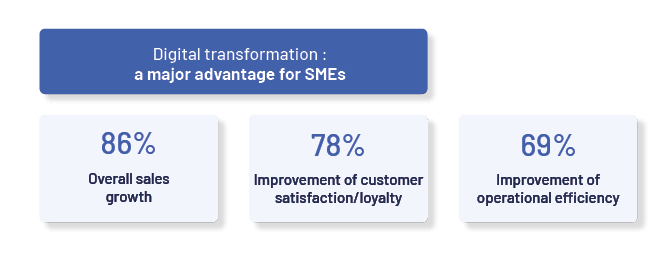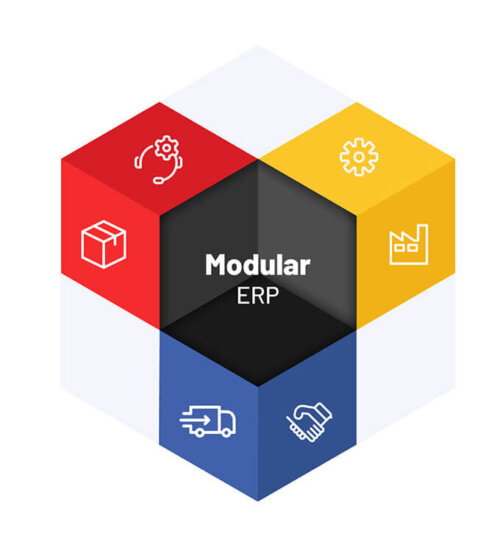SMEs : start your digital transformation with the right ERP
The notion of digital transformation, also known as digital transformation, is more than ever at the heart of the news for VSEs and SMEs.
This consists of integrating new digital services within the company, whether they be tools dedicated to mobility, the use of the Internet in almost all current aspects of work, taking advantage of big data, the IoT (Internet of Things), the blockchain, etc.

The digital transformation : a growth opportunity not to be neglected for SMEs
The digital transformation is therefore not yet a top priority for SME managers, and wrongly so !
Digital transformation is a key factor for the sustainability and growth of SMEs. Indeed, the latest IPSOS “growth and digital” barometer published in 2019 clearly indicates that SMEs that have embarked on a digital transformation process now achieve more than 25% of their growth thanks to this new digital opening.
In addition, the study shows that, for SMEs and ETIs developing a truly multi-channel strategy thanks to the new digital tools, an overall growth in sales is noted in 86% of cases, as well as an improvement in customer satisfaction and loyalty in 78% of cases, and an improvement in operational efficiency in 69% of cases.

What is the place of ERP within the digital transformation ?
In this context of new value creation, ERP is now a central element. Indeed, it allows us to respond to many issues related to digital transformation :
|
|
It is also essential to stress the fact that an ERP allows you to centralise all your company’s key information in a single database, and to have unified tools for all employees. This information processing, which enhances the value of data and exploits it by making it available and relevant within the same tool, is a concept that is at the very heart of digital transformation.
Data, and therefore your information, must no longer be scattered among a multitude of databases and unsuitable tools, but must serve to boost your competitiveness by making the most of them.
This is at the heart of the ERP : your data is aggregated, analysed and compared to provide you with indicators and dashboards to improve the management of your company. Many ERP publishers integrate BI (Business Intelligence) tools to provide you with synthetic views and dashboards to facilitate decision-making.
How should an ERP capable of being included in my company’s digital transformation process work?
UA good ERP must have the particularity of operating in a modular way. The various functionalities are thus grouped into modules that you can arrange and integrate within your SME as you develop and digitise. In this way, you can start with a module dedicated to commercial and production management, and then integrate a module dedicated to after-sales service management at a later stage. This modular operation gives you a tool that follows the evolution of your structure and also allows you to limit costs during the very first phase of deployment.

The ERP that will accompany you on the road to digital transformation should also not limit you : its functionalities must be extended, its updates must be frequent, and you must ensure that you have a competent project team that is expert in your field of activity. It may therefore be relevant to trust an editor and integrator who understands your business issues and who has recognised know-how in the operation of SMEs.
Finally, think mobility ! The digital transformation of your SME should allow you to gain flexibility and access your tools anywhere and anytime ! With these criteria in mind, and these arguments in favour of ERP as the tool of first choice in your digital transformation strategy, all you have to do is take the plunge !